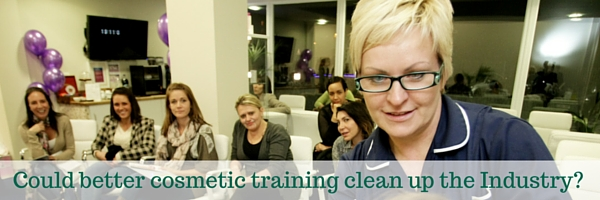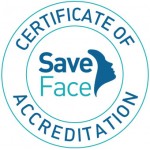
With shocking celebrity photos and a never-ending supply of horror stories on Botched Bodies, as aestheticians we’re up against it. But what can we do to clean up the reputation of the cosmetic industry?
The long-awaited Keogh Report, published in 2013, found what most of us in the industry already know. Non-surgical cosmetic treatments are grossly under-regulated.
And while the report made several recommendations, so far it hasn’t translated into new legislation.
So in the absence of strong regulations, it’s our responsibility as practitioners to do what we can to reassure patients. And there’s a couple of important ways we can do that.
Cosmetic Training
 Unfortunately, lax rules have created conditions where unqualified, unscrupulous practitioners have been allowed to flourish.
Unfortunately, lax rules have created conditions where unqualified, unscrupulous practitioners have been allowed to flourish.
It’s hugely disappointing that Botox and fillers can be legally injected by people without any medical training. So if we want to raise standards, those of us who recognise the need for proper training need to make our voices heard.
Pursuing the best, most comprehensive cosmetic training we can, and displaying our credentials, is vital. We need to create a ‘race to the top’, where the best practitioners help decide the new norm.
Talking to patients about our training, in the form of newsletters and displayed certificates, will help raise awareness – and put clear water between us and unqualified practitioners.
We need to make sure patients expect their practitioners to be medically qualified, and have pursued additional cosmetic training.
Our patients trust us. So it’s our duty not only to make sure we’ve pursued the best training we can, and are updating it as needed, but to make sure they know how important that is.
Accreditation
 Accreditation is voluntary, so by seeking it out you’re sending a powerful message to your patients, and by extension, the industry. The bare minimum is not enough.
Accreditation is voluntary, so by seeking it out you’re sending a powerful message to your patients, and by extension, the industry. The bare minimum is not enough.
The organisation Save Face was founded in 2013 as a direct response to the Keogh Review of the Regulation of Cosmetic Interventions.
Their Save Face Scheme is a voluntary register of cosmetic practitioners who have been thoroughly vetted by doctors.
It gives independent accreditation to practitioners and clinics who complete a rigorous cosmetic training programme and demonstrate that their practice complies with robust standards.
They check professional credentials, interview practitioners, and visit clinics to ensure they’re fit for purpose, all products are stored correctly and data protection is adhered to.
Accreditation is a reassuring ‘shorthand’ for patients. A prominent logo lets them know that their practitioner conforms to certain standards, and has nothing to hide.
The more practitioners seek and achieve accreditation, the more patients will start to look for it as a minimum standard.
At Cosmetic Courses, we’ve teamed up with Save Face to promote their enhanced accreditation programme to our delegates. All those who meet the criteria and achieve Save Face accreditation are entitled to a discount on further training with us.
As professionals, the power is in our hands to bring about the changes we want to see in the industry.
Educating ourselves and our patients, and seeking accreditation, are powerful tools to help raise the bar when it comes to patients’ expectations. And in time, those clinics and practitioners who don’t measure up will either have to take steps to improve, or fall by the wayside.
Cosmetic Courses offer cosmetic training to medical professionals looking to move into the aesthetics industry. We have training centres throughout the UK, including Bucks, Birmingham, Leeds, London, Kent and Essex. For information on any of our cosmetic training courses, call the team on 01844 318317 or email us at [email protected].








